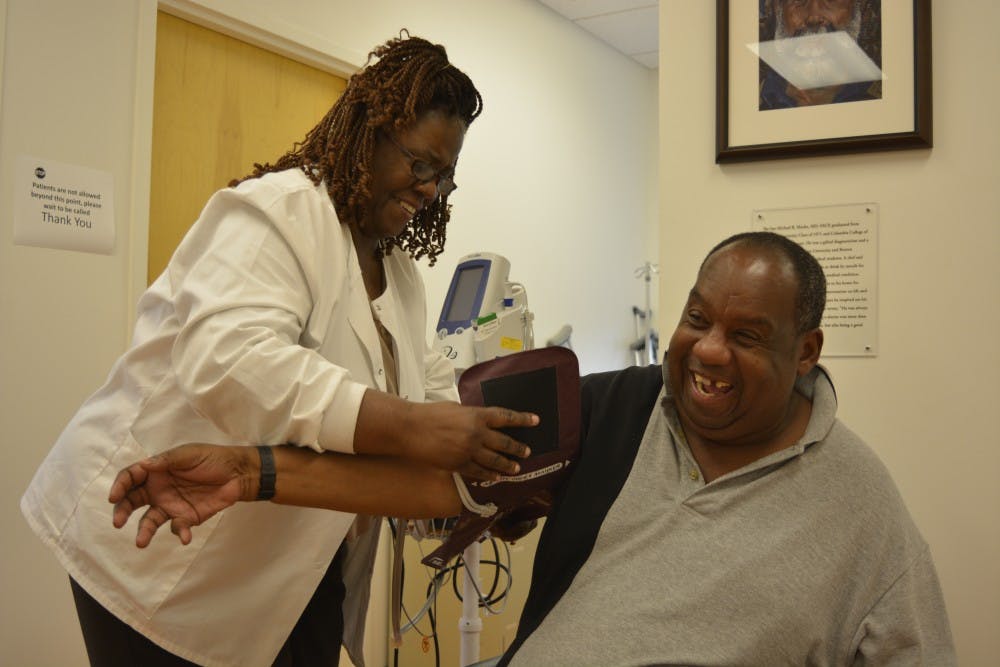Funding for the clinics is included in the Community Health Investment, Modernization and Excellence Act of 2017. While the legislation would fund community health centers until Fiscal Year 2022, it was referred to the U.S. House Committee on Energy and Commerce on Sept. 13, and no further action has been taken.
U.S. Sen. Thom Tillis, R-N.C., signed a bipartisan letter Sept. 19 to the Senate Committee on Health, Education, Labor and Pensions expressing support for the clinics and urging action before the deadline. U.S. Sen. Richard Burr, R-N.C., is on the committee.
Brian Toomey, CEO of Piedmont Health, said some legislators said they won’t vote for the bill until they can figure out how to offset the cost elsewhere.
“We’ve never had a situation where we can only get money for these millions of people if someone shows us where we’re going to get this money from someplace else,” he said.
Ciara Zachary, a policy analyst for the Health Advocacy Project at the progressive NC Justice Center, said the debate over the Affordable Care Act overshadowed the need for reauthorizing the funding.
“Because there was so much of a focus for more of our conservative lawmakers on last-minute attempts to pass the Graham-Cassidy bill or any way to weaken or repeal the ACA and gut Medicaid, I think some of these issues like CHIP or community health centers just got put on the back burner,” she said.
U.S. Rep. David Price, D-N.C., said in a statement that Congress’ failure to reauthorize the funding is “shameful.”
“Republicans in Congress should be focused on prioritizing the health of our nation’s citizens, rather than stripping millions of care and coverage through dangerous budget proposals and reckless efforts to derail the Affordable Care Act,” he said.
What’s at stake
Funding cuts will not officially take effect until the next budget period, but clinics are already making adjustments.
Seventy-two percent of clinics surveyed by the National Association of Community Health Centers said they will institute a hiring freeze, and nearly half said they will reduce staff hours and hours of operation.
“It’s this sort of cloud of uncertainty that we frankly have been dealing with since the ACA debate,” DeVries said. “It’s hard to think ahead when you’re just trying to figure out whether or not you’re going to survive.”
To get the day's news and headlines in your inbox each morning, sign up for our email newsletters.
The U.S. Health Resources and Services Administration predicts 9 million patients nationwide will lose coverage, 2,800 sites will be closed and 51,000 providers and staff will be laid off if the funding is not addressed.
In North Carolina, 34 percent of the funding for community health centers comes from federal grants, according to the N.C. Community Health Center Association.
Toomey said Piedmont’s clinics will be forced to stop seeing many uninsured patients.
“The end result is just shifting people from a low-cost, high-quality program like ours and shifting them into emergency rooms and putting more burden of uncompensated care on hospitals,” he said.
The median per-patient cost for a community health center visit is $151, compared to $1,233 for an emergency room visit.
Katherine Restrepo, director of health care policy at the conservative John Locke Foundation, said the community clinics help make health care affordable and price transparent for uninsured and insured patients alike.
“When you have lean resources to work with, you can be more creative and think outside of the box for patients," she said.
Piedmont Health trains 36 third-year medical students from the UNC School of Medicine each year for the family medicine rotation. DeVries said the training costs the clinics more money than they receive from UNC. She said a loss of funding would make it difficult to afford the program.
Bret Robinson, a third-year medical student at UNC completing a clinical rotation with Piedmont Health Services, said the experience has taught him not to judge the patients he's seen — ranging from migrant farmworkers to homeless people — for their decisions.
"The empathy that I have developed and the perspectives I have gained will change the way I approach every single patient interaction," he said.
For Smith, that nonjudgmental attitude is key to her patient experience, and a stark contrast from care she has received elsewhere.
“They treat you with dignity," she said. "They don’t make you feel like a second-class citizen."
@daniellechemtob
state@dailytarheel.com



